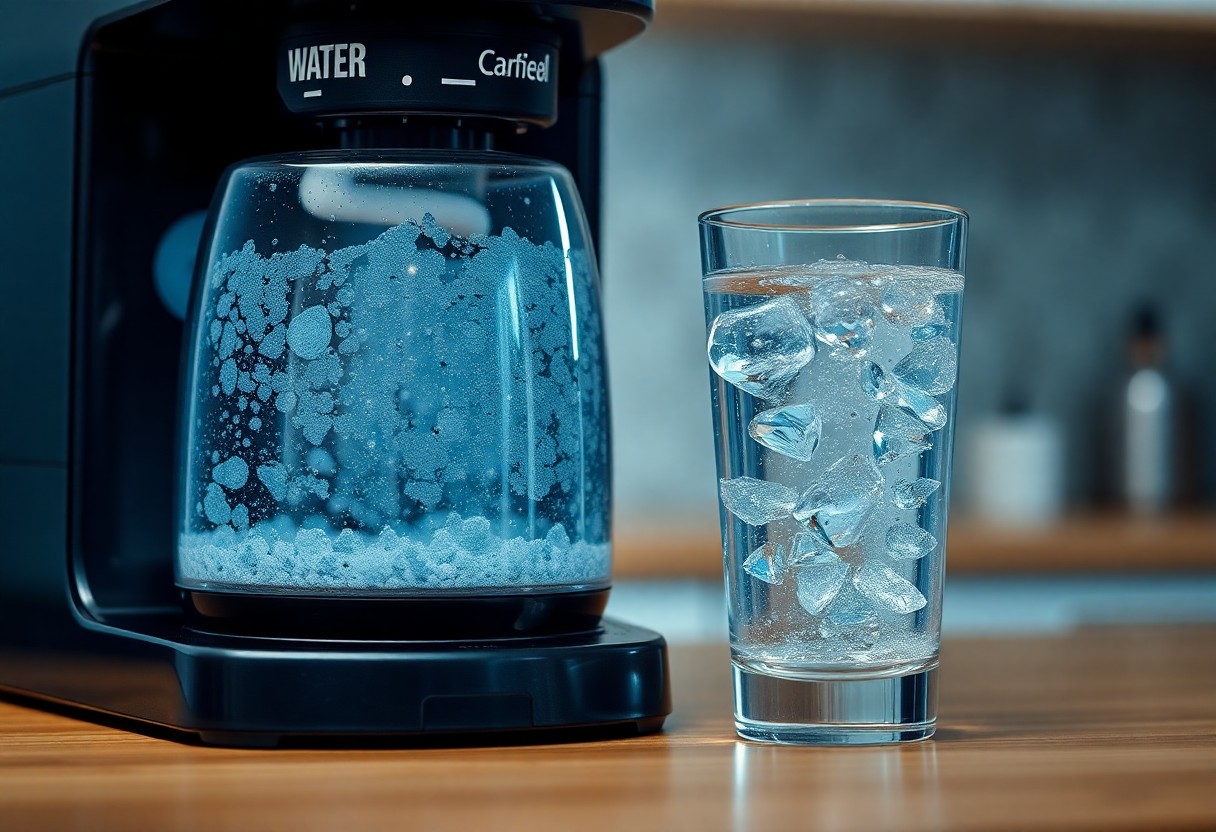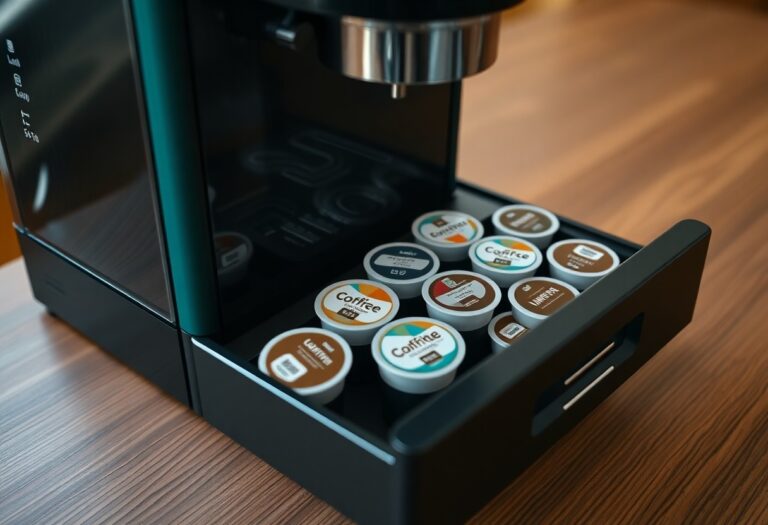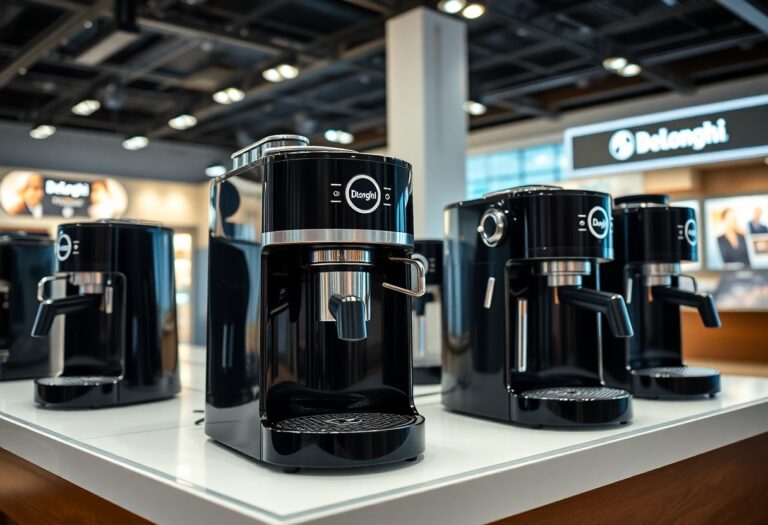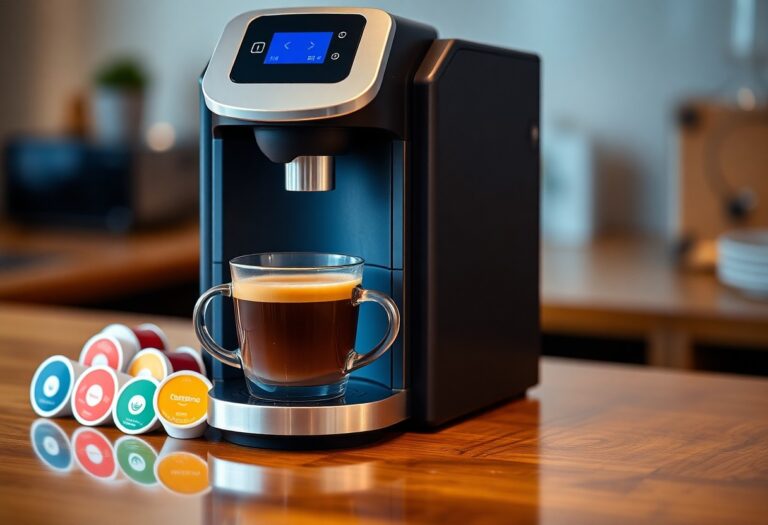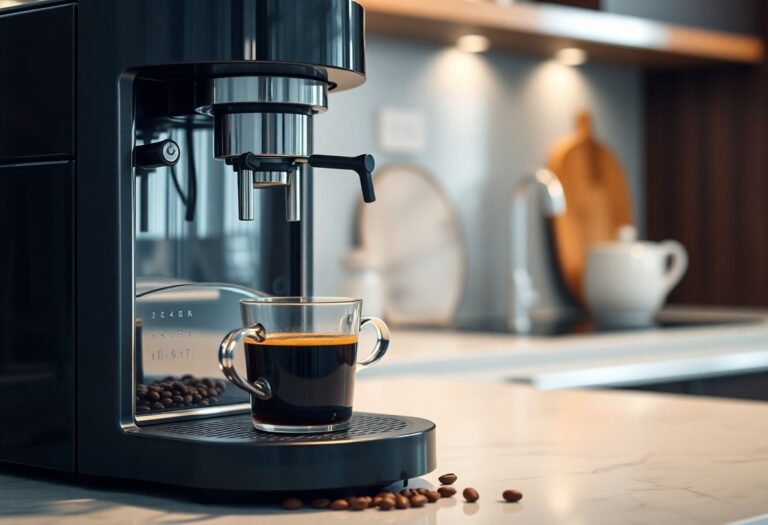What is Water Hardness in a Coffee Machine – Mineral Impact
Hardness refers to the concentration of minerals, particularly calcium and magnesium, present in your water, which can significantly affect your coffee brewing process. You may not realize that hard water can lead to scale buildup in your coffee machine, negatively impacting its performance and longevity. Conversely, using soft water can enhance the extraction of flavors, resulting in better-tasting coffee. Understanding the mineral content of your water is important for maintaining your coffee machine and ensuring every cup you brew is delicious.
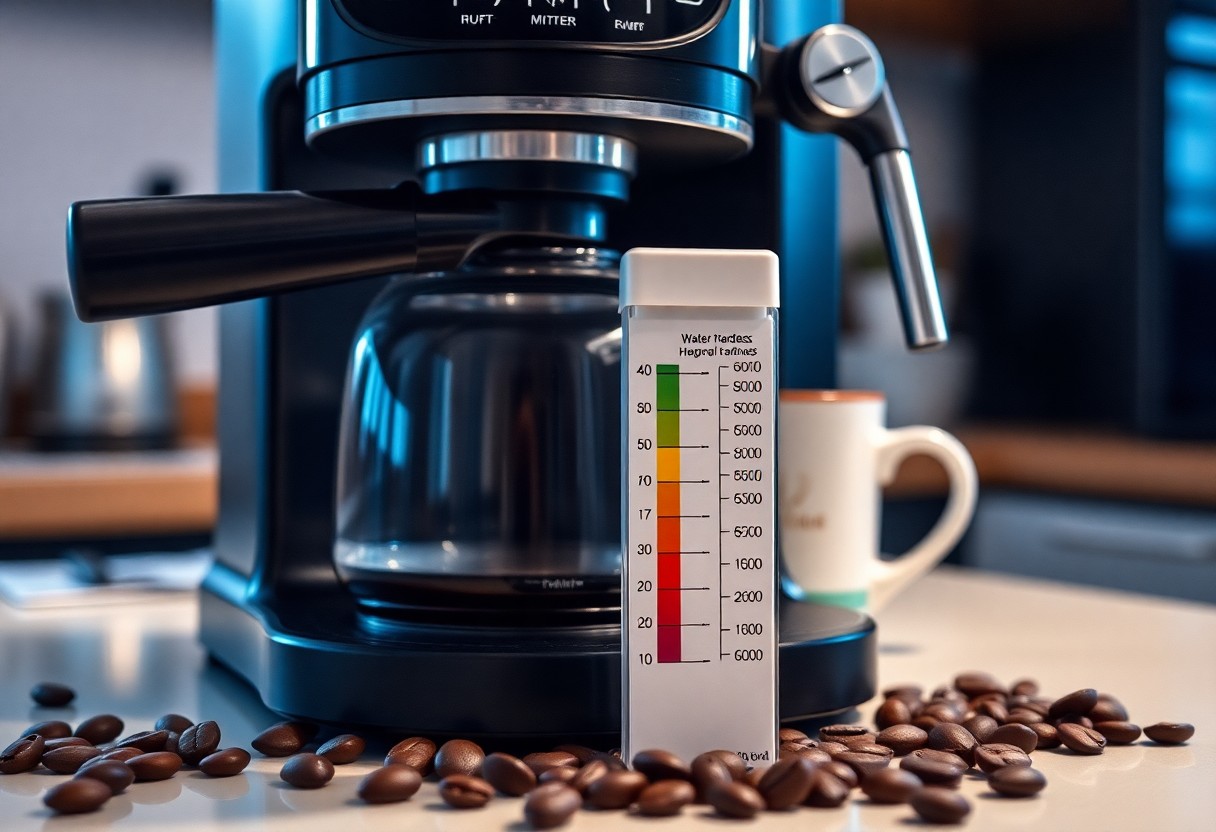
Key Takeaways:
- Water hardness in coffee machines refers to the concentration of calcium and magnesium minerals present in the water used for brewing coffee.
- Hard water can lead to scale buildup within the coffee machine, affecting its performance and lifespan over time.
- Using soft or filtered water can enhance the extraction process and improve the overall flavor profile of brewed coffee.
- Testing water hardness is important to determine the appropriate maintenance and descaling frequency needed for optimal machine operation.
- Different coffee machines may have varying tolerances for water hardness, so checking the manufacturer’s guidelines is advisable.
The Mineral Composition of Water
The mineral composition of water, particularly when it comes to coffee brewing, dictates not just the taste but the performance of your coffee machine. Your water often contains a mixture of dissolved minerals, including calcium, magnesium, sodium, and potentially harmful contaminants. Each can significantly alter the extraction process and ultimately affect the flavor profile and quality of the brew. For a deeper understanding of how these elements play a role, check out Dissolved Minerals in Water and Their Effect On Coffee.
Key Minerals Affecting Hardness
Calcium and magnesium are the key players in determining water hardness. High concentrations of calcium enhance flavor extraction, while magnesium contributes to a smooth finish. Conversely, excessively hard water can lead to mineral buildup within your coffee machine, necessitating more frequent maintenance. Keeping an eye on the balance of these minerals can help optimize both your machine’s performance and your coffee’s flavor.
Measuring Water Hardness Levels
Water hardness levels can be measured using various methods, including test strips or digital testers. These tools provide a quantitative measure of mineral content, usually expressing hardness in parts per million (ppm) or grains per gallon. Depending on your brewing equipment and coffee preferences, a hardness level between 50-150 ppm is generally recommended for the best results.
Assessing your water’s hardness enables you to tailor your coffee-making setup for optimum extraction and flavor. Test strips are a practical option for at-home use, while digital testers offer more precision. If your water tests as hard, consider filtering or softening options to improve your coffee experience. Regular monitoring can help prevent scale buildup, ensuring the longevity of your coffee machine while optimizing each cup’s flavor profile.
The Detrimental Effects of Hard Water on Coffee Machines
Hard water can wreak havoc on your coffee machine, leading to a multitude of operational issues that can undermine the overall performance and longevity of your equipment. Over time, increased mineral deposits can hinder the machine’s ability to heat water efficiently and can also affect brewing times. This can result in not only a tedious cleaning regimen but also costly repairs or replacements if left unchecked.
Scaling: The Silent Killer of Performance
Scaling occurs when mineral deposits accumulate inside your coffee machine, obstructing pipes, boilers, and valves. This build-up reduces efficiency, causing your machine to work harder and ultimately leading to malfunctions. In severe cases, scaling can even cause overheating or complete failure of critical components, risking your investment in the long run.
Impact on Flavor Profiles and Extraction Quality
The presence of hard water significantly influences the extraction process of coffee. High levels of calcium and magnesium can lead to over-extraction, resulting in a bitter taste and masking the brighter notes of your beans. Additionally, the mineral composition affects the solubility of compounds in coffee, ultimately altering the intended flavor profiles. You may find that your favorite coffee blend tastes different or less vibrant due to the quality of the water being used.
A study conducted by coffee researchers found that water with balanced mineral content yields a more harmonious balance of flavors. For instance, water rich in calcium can enhance sweetness while reducing acidity, yet too much can overpower delicate notes. The right balance ensures optimal extraction, which is vital for achieving the full potential of your coffee. Using filtered or softened water can mitigate these issues and allow you to enjoy every subtle flavor your beans offer.
The Benefits of Softened Water in Brewing
Softened water offers several advantages for your coffee brewing experience. By reducing the mineral content, it minimizes scaling within your machine, leading to improved performance and taste. The clear, clean profile of softened water allows the actual flavors of your coffee beans to shine through, providing a more enjoyable cup and enhancing the overall brewing process.
Enhancing Coffee Taste and Aroma
Using softened water can greatly enhance the taste and aroma of your coffee. Soft water allows the coffee’s natural flavors to express themselves without interference from minerals that might muddy the profile. As a result, your brew can achieve a more balanced acidity and a richer, more aromatic experience, prompting you to savor every sip.
Prolonging the Lifespan of Equipment
Softened water plays a significant role in extending the lifespan of your coffee machine. Mineral deposits that accumulate over time can lead to clogs, decreased efficiency, and costly repairs. Softened water helps to prevent these deposits, allowing your equipment to operate smoothly and reducing the frequency of maintenance and replacement.
Investing in a water softening system not only protects the internal components of your coffee maker but also helps maintain optimal operational conditions. For instance, studies show that machines exposed to high mineral content can experience up to 30% reduction in efficiency over time. By utilizing softened water, you can keep your machine working efficiently, saving you money on repairs and extending its lifespan by years. This leads not only to a better brewing experience but also a more sustainable approach to your coffee habit.
Practical Solutions for Managing Water Hardness
Managing water hardness is important for optimizing your coffee brewing experience. You can implement various strategies to mitigate the effects of hard water, from simple water testing to more advanced treatment options. Recognizing the specific characteristics of your water source allows you to make informed decisions about how to enhance the quality of your coffee. By taking action, you ensure that every cup you brew is rich in flavor, free of unwanted mineral buildup, and extends the life of your coffee machine.
Testing Your Water: Tools and Techniques
Analyzing your water’s hardness is a straightforward process with the right tools. Test strips are a popular choice, offering an easy and quick method to determine the mineral levels in your water. Alternatively, you can use a digital TDS meter that measures total dissolved solids, providing a more precise reading. By understanding your water quality, you can tailor your brewing methods and maintenance routines accordingly.
Options for Water Treatment and Filtration
Implementing effective water treatment and filtration systems can significantly improve your brewing conditions. Common solutions include carbon filters, which help eliminate impurities and chlorine, and ion-exchange resins that soften hard water by replacing calcium and magnesium ions. Additionally, consider using a reverse osmosis system, which provides purified water that you can remineralize for optimal brewing. These filtration options not only protect your coffee maker from scale buildup but also enhance the taste of your coffee.
The type of water treatment system you choose can depend on various factors, including your budget and the level of hardness in your water. For instance, a simple carbon filter may suffice for light hard water, while those with high mineral concentrations could benefit from a reverse osmosis setup. Remineralization filters are also available, allowing you to customize the mineral balance, ensuring the water remains optimal for brewing coffee. Researching available technologies and understanding your specific needs will empower you to make the best selection for your coffee machine and palate.
The Broader Implications of Water Hardness in Coffee Culture
Water hardness extends far beyond the mechanics of your coffee machine, shaping the very fabric of coffee culture. From artisanal roasteries to cozy cafes, the quality of water used can dictate the final flavor profile of specialty brews. Skilled baristas and coffee enthusiasts alike are more frequently acknowledging water’s role as a key variable, influencing everything from taste to aroma.
Water Quality as an Unsung Hero in Coffee Craftsmanship
Often overlooked, water quality acts as an unsung hero in coffee craftsmanship. The distinctive taste of your favorite brew can largely depend on the minerals present in the water used for extraction. Softened water can enhance flavors by allowing the coffee’s intrinsic characteristics to shine, making it an imperative component in achieving the ideal cup.
How Local Water Sources Influence Coffee Experience
Local water sources significantly influence coffee experience, reflecting regional characteristics in each cup. For instance, water sourced from regions rich in specific minerals like calcium and magnesium can lead to variations in acidity and sweetness, affecting the overall taste profile. This local fingerprint often results in unique brewing styles and flavor palettes that are reminiscent of the area’s geology.
In cities known for their soft water, coffee tends to possess a cleaner, more nuanced taste, while areas with hard water may produce brews with bolder, more robust profiles. The impact of these local nuances is not to be underestimated; for example, a coffee from a mineral-rich region may be celebrated in its locale yet struggle to achieve similar acclaim elsewhere. Crafting coffee experiences that respect and embrace these regional differences can elevate the appreciation of each cup, creating a deeper connection between consumers and their local coffee culture.
Final Words
From above, you can see that understanding water hardness in your coffee machine is crucial for brewing the best cup of coffee while prolonging the life of your appliance. The minerals in hard water can negatively affect both the flavor of your coffee and the functionality of your machine. By being aware of these factors, you can take steps to mitigate the impact of hard water. For further insights, check out this article on Why Water Hardness is Harmful to your Machine and Coffee.
FAQ
Q: What is water hardness and how is it measured?
A: Water hardness refers to the concentration of dissolved minerals, primarily calcium and magnesium, in water. It is typically measured in parts per million (ppm) or grains per gallon (gpg). Water is considered ‘hard’ when it contains more than 120 ppm of calcium carbonate. A water hardness test kit can provide specific measurements to determine the mineral content of your water supply.
Q: How does water hardness affect coffee brewing in a coffee machine?
A: Water hardness has a significant impact on the extraction process of coffee. Hard water can lead to over-extraction as the minerals in the water can interact with coffee compounds differently compared to soft water. This may result in bitter flavors and a decrease in the overall quality of the brewed coffee. On the other hand, using water with the right balance of minerals can enhance the flavor and aroma of the coffee.
Q: What are the signs of hard water affecting my coffee machine?
A: Some common signs that hard water is affecting your coffee machine include the presence of scale buildup inside the machine, specifically in the water reservoir, heating element, and coffee lines. You may also notice a decrease in water flow rate or strange tastes in your brewed coffee. Regular maintenance and descaling can help mitigate some of these issues, but it’s vital to monitor your water quality.
Q: What can I do to manage water hardness in my coffee machine?
A: To manage water hardness, you can use filtered or bottled water that is specifically labeled as low in minerals. Alternatively, installing a water softener or using descaling solutions can help to reduce mineral buildup in your coffee machine. Regular maintenance, such as descaling your machine every few months, can also significantly improve its performance and longevity.
Q: Are there any specific types of water recommended for brewing coffee?
A: The best water for brewing coffee typically has a balance of minerals, with a hardness level between 50 to 100 ppm for optimal taste. This allows for proper extraction without over-extracting. Many coffee enthusiasts recommend using filtered water or spring water that has a balanced mineral content, as it can elevate the flavor profile of the coffee while helping to reduce scaling in the machine.

